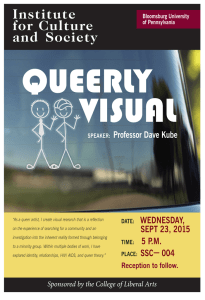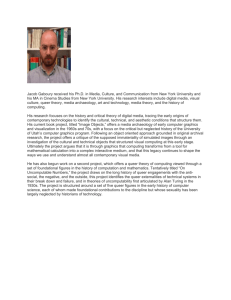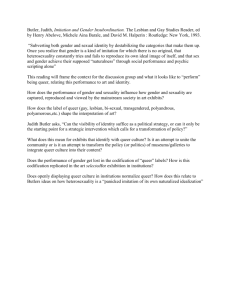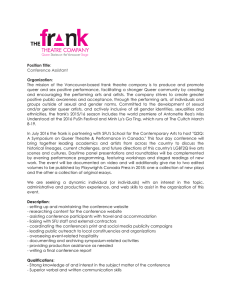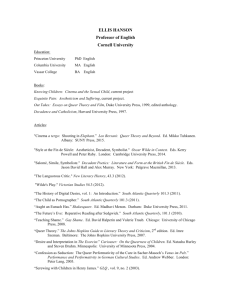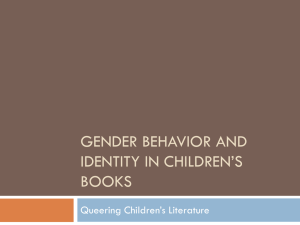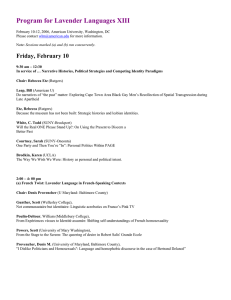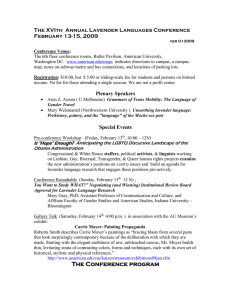Cum egrederetur Sodoma de Aegypto . . .
advertisement
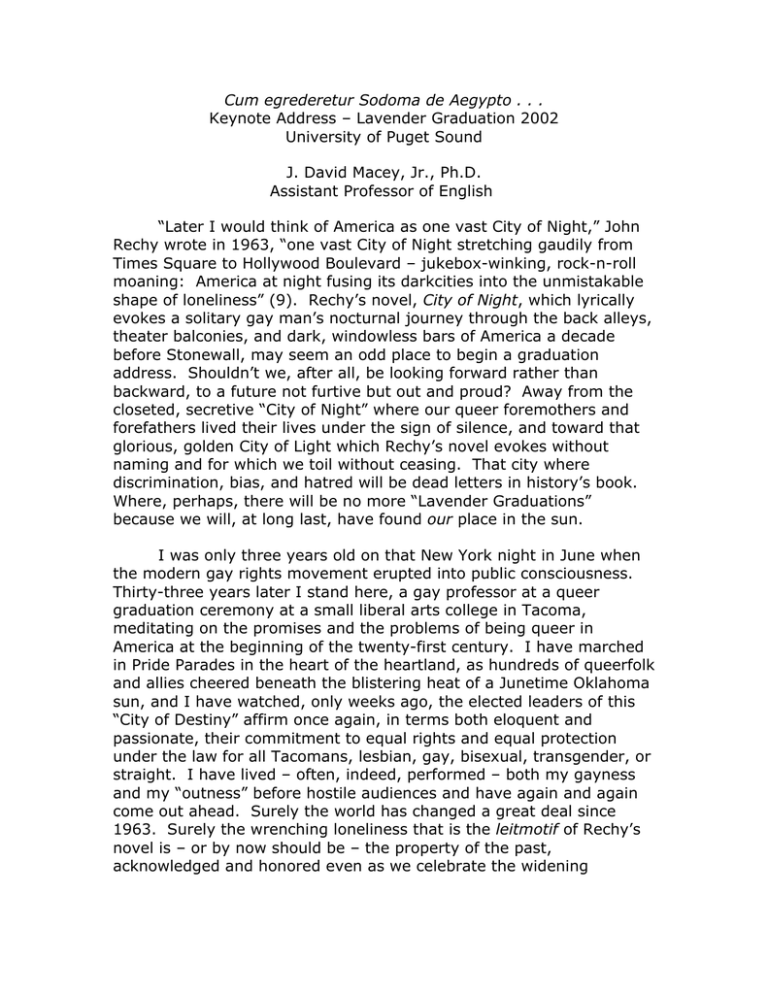
Cum egrederetur Sodoma de Aegypto . . . Keynote Address – Lavender Graduation 2002 University of Puget Sound J. David Macey, Jr., Ph.D. Assistant Professor of English “Later I would think of America as one vast City of Night,” John Rechy wrote in 1963, “one vast City of Night stretching gaudily from Times Square to Hollywood Boulevard – jukebox-winking, rock-n-roll moaning: America at night fusing its darkcities into the unmistakable shape of loneliness” (9). Rechy’s novel, City of Night, which lyrically evokes a solitary gay man’s nocturnal journey through the back alleys, theater balconies, and dark, windowless bars of America a decade before Stonewall, may seem an odd place to begin a graduation address. Shouldn’t we, after all, be looking forward rather than backward, to a future not furtive but out and proud? Away from the closeted, secretive “City of Night” where our queer foremothers and forefathers lived their lives under the sign of silence, and toward that glorious, golden City of Light which Rechy’s novel evokes without naming and for which we toil without ceasing. That city where discrimination, bias, and hatred will be dead letters in history’s book. Where, perhaps, there will be no more “Lavender Graduations” because we will, at long last, have found our place in the sun. I was only three years old on that New York night in June when the modern gay rights movement erupted into public consciousness. Thirty-three years later I stand here, a gay professor at a queer graduation ceremony at a small liberal arts college in Tacoma, meditating on the promises and the problems of being queer in America at the beginning of the twenty-first century. I have marched in Pride Parades in the heart of the heartland, as hundreds of queerfolk and allies cheered beneath the blistering heat of a Junetime Oklahoma sun, and I have watched, only weeks ago, the elected leaders of this “City of Destiny” affirm once again, in terms both eloquent and passionate, their commitment to equal rights and equal protection under the law for all Tacomans, lesbian, gay, bisexual, transgender, or straight. I have lived – often, indeed, performed – both my gayness and my “outness” before hostile audiences and have again and again come out ahead. Surely the world has changed a great deal since 1963. Surely the wrenching loneliness that is the leitmotif of Rechy’s novel is – or by now should be – the property of the past, acknowledged and honored even as we celebrate the widening distance, in time and cultural space, that separates us from a world in which lives and loves like ours dared not speak their names. We all know, of course, that it’s not that simple, that we aren’t over the rainbow yet, that violence, alienation and despair are daily realities in the lives of queer men and women throughout our city and our world. Even as we celebrate the tremendous accomplishments of our lavender graduates this afternoon, the forces of reaction are mustering in an effort to repeal – once again – the legal protections our city has extended to the queer community. Conscious that we stand in a unique and privileged position, we are nonetheless aware that there are many battles yet to be fought, many lessons yet to be taught, and many lives to be changed, our own not least among them. We have one another, though, queer folk, our straight allies, and every seeking soul whose questions, spoken aloud, bear witness to a revolution more radical and sweeping than, I suspect, any of us can fully appreciate. What strikes me as most remarkable in our history over the course of the past forty years is the development of queer communities that name themselves. Communities that embrace the challenges of a legacy of oppression, marginalization, and enforced invisibility even as they move beyond that history to embrace a dazzling – and daunting – array of opportunities unimaginable to our queer forebears. What, then, of the “unmistakable shape of loneliness,” so palpable to Rechy’s tortured narrator and, I suspect, familiar as well to most – if not all – of us in this room? Two decades ago, sitting in the shade of the Maple Walk at Andover, I wrote a series of very bad poems not so much about what it meant as about how it felt to be “queer” in every sense of the word. There are, of course, good reasons why I am not and ought not be a “Creative Writer,” as rereading these poems has forcefully reminded me. “I don’t make it,” I began, self-judgmentally, “Probably not as what I am, / Certainly not as what I ought to be.” I concluded, with a prescience that still surprises me, “I need to live, without watching myself, / If I can.” Extreme self-consciousness rooted in my sense of “queerness,” of difference, and its concomitant, a solitary sense of being always on the outside looking in on a world to which I would never (quite) belong will forever color my memories of growing up gay. Not discolor them, but tint them a lonely shade of lavender. Perhaps this sense of difference, alienating but also strangely empowering, has something to do with why we have gathered here this afternoon. Why do we graduate before graduation? Why do we claim this room as our own, naming ourselves as a people set apart before we plunge back into the main stream of celebration on this weekend of conclusions and commencements? I continue to revolve in my head the relationship between being “out” and being an “outsider” in even the most accepting of environments because it seems to me to be a crucial fact of queer identity – perhaps the crucial fact of my queer identity. The anthropologist Victor Turner, more or less Rechy’s contemporary, speaks of the special, perilous but potent status of “liminal” individuals, those “threshold people” who “elude or slip through the network of classifications that . . . locate states . . . in cultural space.” Standing “neither here nor there,” they – and we – occupy an ambiguous position, poised “betwixt and between the positions assigned . . . by law, custom, convention, and ceremonial” (95). We stand “betwixt and between” this afternoon, pausing to rest and share the manna of friendship in the midst of our journey from Rechy’s “City of Night” to a “City of Light” that deep in our hearts we do believe we’ll reach someday. No longer outcasts nor yet fully accepted or affirmed, we cultivate an uncomfortable but fruitful middle ground. The singular opportunity offered by life in the “in-between,” life “on the road,” is the chance to build a community anchored not in the particularities of class, race, gender, age, education, or even our related (but always unexpectedly dissimilar) ways of loving, but rather in our mutual knowledge of “the unmistakable shape of loneliness,” in our shared experience of being, with Byron’s Childe Harold, ever and again “among” multitudes “but not of them,” wrapped “in a shroud / Of thoughts, which [are] not their thoughts” (3.113.1055-56). Our shared “queerness” offers us the opportunity to experience a radical form of community, “comitatus, . . . even [a] communion of equal individuals” (Turner 96). Isn’t that community, that “communion,” one of the things we’ve been seeking all these years? Isn’t that part of why we’re here afternoon? What we’re doing is creating community by sharing our stories, recognizing and claiming a common ground whether we know one another well or hardly at all. In the process, at our best, we are modeling a way of living – and loving – inclusively and affirmingly. The world is watching and learning – for the eyes of the world are always upon us, most of all when it pretends to look the other way. Our pride in ourselves, in one another, in our survival and in our achievements, and our resolution to make the dreams that we dare to dream come true are signs – signs of contradiction, to be sure, but also signs of hope, promises of what the world can be and will become, both for us and because of us. It’s not easy being prophets, as the sacred texts of every tradition and culture make clear. Even now, our perilous, privileged community seems often on the verge of shattering, scattering before the four winds as we confront the different ways in which we have lived, loved, and suffered. As we stand on the threshold of a new millennium, the currents of change swirling about us, we have perhaps as great a need as ever to come together, remembering the City of Night from which we have come and the City of Light that we hold in our mind’s eye as a beacon and a goal. “Improve[me]nt makes strait roads,” the poet William Blake wrote more than two hundred years ago, “but the crooked roads without Improvement are the roads of Genius” (pl. 10). The road ahead of us is crooked indeed. Its twistings and turnings are not always marked, and it often seems to double back, leading us over the same ground again and again. Having passed over the “straight” road in order to pursue our own, queer path, though, we prophetic people feel in our hearts the truth of the prophetic poet’s words. We are treading upon the heels of genius, “And the work that we [are] build[ing], oft[en] with bleeding hands and tears, / Oft[en] in error, oft[en] in anguish, . . . // . . . will [indeed] pass into the splendors of the city of . . . light” (Adler 140). Works Cited Adler, Felix (1851-1933). “Hail the Glorious Golden City.” 1878. Singing the Living Tradition. Boston: Beacon Press, 1993. 140. Blake, William (1757-1827). The Marriage of Heaven and Hell. 1794. Ed. Sir Geoffrey Keynes. Oxford & New York City: Oxford Univ. Press, 1975. Gordon, George, Sixth Baron Byron of Rochdale (1788-1824). Childe Harold’s Pilgrimage. 1812-18. The Oxford Authors: Byron. Ed. Jerome J. McGann. Oxford & New York City: Oxford Univ. Press, 1986. 19-206. Rechy, John (b. 1934). City of Night. 1963. New York City: Grove Press, 1984. Turner, Victor (b. 1920). The Ritual Process: Structure and AntiStructure. 1969. Ithaca, N.Y., & London: Cornell Univ. Press, 1977.
